- Home
- Allison Brennan
Speak No Evil
Speak No Evil Read online
CONTENTS
TITLE PAGE
DEDICATION
ACKNOWLEDGMENTS
PROLOGUE
CHAPTER ONE
CHAPTER TWO
CHAPTER THREE
CHAPTER FOUR
CHAPTER FIVE
CHAPTER SIX
CHAPTER SEVEN
CHAPTER EIGHT
CHAPTER NINE
CHAPTER TEN
CHAPTER ELEVEN
CHAPTER TWELVE
CHAPTER THIRTEEN
CHAPTER FOURTEEN
CHAPTER FIFTEEN
CHAPTER SIXTEEN
CHAPTER SEVENTEEN
CHAPTER EIGHTEEN
CHAPTER NINETEEN
CHAPTER TWENTY
CHAPTER TWENTY-ONE
CHAPTER TWENTY-TWO
CHAPTER TWENTY-THREE
CHAPTER TWENTY-FOUR
CHAPTER TWENTY-FIVE
CHAPTER TWENTY-SIX
CHAPTER TWENTY-SEVEN
CHAPTER TWENTY-EIGHT
CHAPTER TWENTY-NINE
CHAPTER THIRTY
CHAPTER THIRTY-ONE
CHAPTER THIRTY-TWO
CHAPTER THIRTY-THREE
CHAPTER THIRTY-FOUR
CHAPTER THIRTY-FIVE
CHAPTER THIRTY-SIX
ALSO BY ALLISON BRENNAN
PRAISE FOR ALLISON BRENNAN
PREVIEW FOR SEE NO EVIL
EXCERPT OF SPEAK NO EVIL
COPYRIGHT
For Trisha McKay Richins
A loyal and true friend, and the first person
I trusted enough to read my stories
ACKNOWLEDGMENTS
FIRST AND FOREMOST, I want to thank my readers. If you’ve enjoyed this book, I hope you’ll visit my website at www.allisonbrennan.com to read exclusive content, including deleted scenes, and view book trailers for this and my other books.
San Diego is a beautiful city that I’ve visited many times and look forward to enjoying again. Though I strive for accuracy, I have taken some liberties with the area for story purposes.
As always, several people have helped with the details in this book.
Jennifer Hennessey, who dusted off her criminology degree; Wally Lind, Dan Pollock, and Patrick Murray at Crime Scene Writers, who are always quick to answer questions on anything from postmortem injuries to tracking sexual predators online; author and nurse Candy Calvert, who answered several medical questions; and Gary Olson, consultant for the California State Assembly, who once again shared his knowledge of public safety law so I wouldn’t have to spend days reading the California Legislative Code.
A special thanks goes to Karin Tabke and her husband, ex-cop and all-around good guy Gary, who always answered their phone even when they knew it was me, on deadline, with last-minute questions that were always more complicated than I originally thought.
My husband Dan and our kids deserve extra-special appreciation for giving me the time to write and travel; my mom, who is truly my number-one fan; and everyone in the Sacramento Valley Rose chapter of RWA, who always answered my most arcane questions while giving me unconditional love and support.
And finally, the people who made this book possible: the Ballantine team, especially my wise editor Charlotte Herscher, Dana Isaacson, Kim Hovey, and Gilly Hailparn, who have all been so supportive; the art department, which gave me covers I absolutely love; my super agent, Kimberly Whalen; and the entire Trident Media Group.
PROLOGUE
AT THE VERY BEGINNING, she had seen his face and knew he would not let her live.
She couldn’t plead with him, he’d sealed her mouth shut. No way to beg, to appeal to his humanity. He had no humanity. Why hadn’t she seen it before? Had she been so blind that when he looked at her she couldn’t see the hatred, the anger, the sick lust?
She’d trusted him because she had no reason not to, but looking at him now, she saw the evil he’d hidden so well for so long.
The pain that had kept her awake for two nights had dulled, her body numb from abuse. She didn’t think about it, didn’t think about him, turned into herself, and remembered swimming at the beach. Or talking to her friends. Or how her mom was so proud of her when she graduated high school with honors.
Burning tears leaked from her eyes.
I’m so sorry, Mom.
He untied her once, to give her a bath. She was too weak to run, too tired to fight. But fierce pain reawakened when he scrubbed her body with soap, making her scream, a deep rumbling in her chest that couldn’t escape through her glued lips.
“I need to wash your body,” he told her calmly. “Just in case.”
Just in case of what? The water hurt, but it also woke her up. Maybe she had a chance. Maybe she could escape. If she could just scream, someone would come. Wouldn’t they?
She didn’t even know where she was.
He carried her back to the bed that reeked of her blood, her urine, and worse. She tried to get up, to run, but her legs gave way and she slipped to the floor. He gave an odd, coarse laugh at her weak attempt to escape before picking her up as if she weighed nothing and dropping her on the bed.
Then she saw the garbage bag.
No!
She heard herself but no one else could as the bag came over her head. She fought him with everything she had and the bag tore.
Slap.
The pain across her face was nothing compared to what she had already endured, but her strength didn’t match his. Another dark green plastic bag slid down over her face. She tried to hold her breath but couldn’t. Something else was pulled over her legs. She began to fade. She almost didn’t feel him tie up her body. She was light, a feather.
Death was her escape. There had to be something better than this, something brighter, something happy.
A heavy weight covered her body. Him. He was on top of her and she couldn’t breathe.
Plastic molded to her nose and her chest tightened.
No air…
She couldn’t fight, but her body tried. Her legs weakly kicked, her fingers clawed at the slick lining.
So tired. Can’t.
In the brief moment between life and death, when her body fought but her mind knew there was no hope, an odd peace washed over her.
I’m sorry, Mom.
ONE
HER DEATH HAD NOT BEEN EASY.
Homicide detective Carina Kincaid stared at the dead, naked corpse of the young woman, avoiding the wide-eyed terror etched on her face. Her mouth was gagged, but what drew Carina’s eye was the word slut scrawled in thick black marker across her chest. A small red rose was tattooed on her left breast.
The victim lay in a disjointed fetal position, dried blood on her legs and vicious red welts on her breasts, indicating that her murder had followed a sexual assault. In California, that made the killer eligible for the death penalty. One small step toward justice, but it didn’t satisfy Carina. This Jane Doe would still be dead.
She glanced away from the body, just for a moment, and watched the waves roll up the beach. Back and forth, calming. Her cheeks stung from the early-morning salt air, but in just a few hours she’d be tugging off her windbreaker as the sun peaked over San Diego.
When she first arrived on the scene with Jim Gage, supervisor of the Forensic Field Services Unit of the San Diego Police Department, they immediately documented that the evidence had been contaminated. Three layers of heavy-duty green garbage bags had been cut away from the body. The park ranger hadn’t been able to lift what he thought was trash, so he sliced it open. What had he been thinking?
“I didn’t think there was a body inside,” he’d said when Carina questioned him.
By the tension in Jim’s jaw, it was obvious that he was pissed. But true to form he didn’t say anythin
g. He never said anything, which had been the primary reason Carina had broken up with him last year. She could handle his moodiness—she had four brothers, she could put up with almost anything—but his refusal to talk about what bugged him, on the job and off, was a relationship breaker.
Or maybe they hadn’t loved each other enough to make it work.
Carina glanced behind them when she heard a car approach. The coroner’s van pulled into the empty parking lot and a short, trim, well-dressed Asian man exited the vehicle. Assistant Coroner Ted Chen, the perfectionist. Carina liked it when he pulled one of her cases, even if he made her a bit self-conscious. She triple-checked her reports when he was the responding coroner, afraid to appear the novice despite her nearly eleven years on the job.
“Doctor Chen is here,” she told Jim.
“Hmm.” Jim finished photographing the body and surrounding area, glancing up as Doctor Chen crossed the sand to where the body lay. “Hello, Ted.”
“Gage. Detective.” Chen nodded toward the victim. “Was the body found in this condition?”
“The bag had been intact. The park ranger opened it.”
“Why on earth would he do that?”
Jim removed his wire-rim glasses and rubbed his eyes with his forearm. “Thought it was filled with garbage and planned on taking multiple trips to dispose of the contents.”
Chen shook his head in disgust, his thin lips a tight line. He knelt in the sand, careful to prevent further granules from rolling into the plastic. “She suffocated,” he said quietly.
“You mean she was put into the bag alive?” Carina asked for clarification.
“It would appear so, but the crime lab will need to go over the bag to confirm it,” Chen said. “See her discoloration?” The victim appeared bluish, almost purple. “No oxygen. No sign of strangulation, and no blood in her eyes or ears to indicate it, either. I can give you a better answer at the autopsy.” He glanced at his watch. “I have three autopsies scheduled this morning, but I’ll postpone the afternoon schedule to fit her in.”
“Thanks, Doctor Chen. I appreciate it.”
“I’ll have her on the table at two.”
Carina nodded, caught Jim staring at her, his face unreadable. “You going to join us?” she asked.
“We’ll see how far my team can get with the bag. We’re backlogged as it is.”
No surprise. Contrary to popular television, most evidence wasn’t processed until a suspect was apprehended and a court date set. The wheels of justice also turned the cogs of the laboratory.
Carina forced herself to stare at the victim’s face while Chen and Jim prepared her for transportation to the morgue. She looked so young. Eighteen, maybe. Was she a college student? There were two universities within spitting distance of the beach. Maybe she was still in high school.
She thought about her baby sister. Well, Lucy wasn’t a baby anymore. She was a high school senior and smart enough to go to just about any college she wanted. Their parents wanted her to stay close to home; Lucy desperately wanted to move away. But college campuses were dangerous, and Carina found herself siding with her parents on this one.
Fourteen years ago she wanted the exact same thing as Lucy—to get out from under her parents’ thumb. But that was before she’d decided to become a cop. Before she realized how truly dangerous the city could be. Before she realized that justice wasn’t always swift, and that the system didn’t always work.
That some murders would never be solved.
She turned away from the death scene and stared again at the Pacific Ocean, unconsciously wrapping her arms around her waist. It would be temperate today, as virtually every day was in San Diego. Here on the coast, the cool morning breeze loosed a few strands of dark hair from the French braid Carina wore when on the job. The tide was receding, the waves small and playful, pulling back. The shells and rocks reflected the sunrise behind her, the ocean still dark and mysterious. A pair of early-morning joggers, a man and woman, ran on the packed sand.
Had the girl been murdered here on this quiet, clean beach? Or had Jane Doe been dumped?
Carina voted for dumped, but asked the experts.
“Dumped is my guess,” Jim said. “There’s no sign of struggle, but of course the scene’s been contaminated.” He visually scanned the area to confirm his hypothesis.
Carina followed his gaze to the parking lot adjacent to this stretch of beach. The highway on the other side was beginning to bustle with morning commuter traffic. Dozens of small, outrageously expensive homes lined the opposite side of the road. A few hundred yards north was a beachside shopping area with several popular restaurants and a bar that catered to the college crowd, which, even on a Sunday night, wouldn’t have closed down until the state-mandated two a.m.
That didn’t mean the body hadn’t been dumped before two, but from Carina’s college days as well as her years on patrol, she knew this beach saw heavy traffic until the wee hours of the morning. Before two a.m. it was more than likely someone would have seen a body-size bag being tossed onto the beach.
Usually, body dumps were done when no one was around, to minimize the killer’s chances of being caught.
Though Carina couldn’t absolutely rule out the possibility that the girl had been left earlier, logic suggested that she’d been dumped between three and five in the morning. Commuters hit the road early, and by five-thirty traffic steadily passed only a hundred feet away. Sunrise had hit about thirty minutes ago.
“Do you know when she died?” she asked Chen.
He glanced up at Carina from his position next to the body. “Lividity isn’t fixed, and it’s obvious she’s been moved. Her body temperature is 86.3 degrees. But I’m not sure how being wrapped in the garbage bags would affect the loss of heat.” He glanced at Jim.
“I’ll do some research on that,” Jim said. “I’m thinking it would slow it down, but not by much.”
Chen nodded. “That would mean she died four to twelve hours ago, but I’d put it closer to four to eight hours because rigor mortis hasn’t completely set in. There’s still some movement in her larger muscles.”
Carina made notes. Ten p.m. to two a.m. Sunday night. He killed the girl somewhere else—in a car? The woods? Someone’s house? A secluded stretch of beach? She dismissed the last idea: there were no secluded areas on this part of the coastline, and the police routinely patrolled the area because of the nearby college.
Someone kills her, puts her in their vehicle, and transports her here, to a public beach, where her body would most certainly be found sooner rather than later.
“Arrogant,” she muttered.
“Excuse me?” Jim asked.
“The killer. Arrogant. Dumped her body where we’d quickly find it. Convinced he won’t be caught, thinks he’s smart.”
“Dusting off your psych degree, Carina?” Jim teased.
She rolled her eyes and smiled. Jim knew she’d taken all of one psychology class and had never graduated from college.
She walked over to the uniformed officers and instructed them to canvas the area. “Start with the houses across the street. See if someone noticed anything unusual after ten last night up until five this morning. A suspicious car, strange noise. People on the beach. Then hit the shops up the street when they open, focusing on those open past eight p.m., clubs and bars in particular.”
As she walked back to Jim and Chen she heard a car turn into the gravel parking lot. Her partner, Will Hooper, jumped out and strode across the sand toward them.
Jim shook his head. “Asshole,” he muttered.
“Give it a rest, Jim,” she said.
“Sorry, Kincaid.” Will approached with a guilty grin. “I didn’t hear my beeper go off.”
“What’s her name?”
“Come on, you woke me at five-thirty this morning. Just because you rise before the sun doesn’t mean the rest of us like to suffer.” Forty and divorced, Hooper enjoyed playing the field. He was also a good cop, a veteran, and Carin
a trusted him with her life. He’d taught her how to play hardball in a male-dominated profession, and never once hit on her. Next to her brothers, he was her best friend.
“And? You live ten minutes from here. Did your precious car throw a gasket?”
“Okay, okay. Her name is Monica. And she lives up in Carlsbad, so it took me time to get back down here.”
Carina filled her partner in on what they’d learned. She looked back at the dead girl and noticed something unusual around her mouth.
“Doctor Chen, what’s that?” She knelt beside Jim and gestured toward a thin, pale yellow substance around the edges of the gag.
“Lipstick?” Will said. “Not that you would know about that.” He tugged on her braid.
Carina ignored him. In the increasing sunlight, the gag—a black bandanna—almost shimmered. “I couldn’t say.” Chen frowned.
Jim took out a swab from his kit and wiped the area around Jane Doe’s gag, but nothing appeared to come off. He popped the swab into a sterile tube and closed it. Leaning close to the dead girl’s face, he breathed deeply, frowned. Taking prongs, he attempted to remove the gag. It was then that Carina noticed the bandanna wasn’t tied. The end was wrinkled, as if it had at one point been tied in a knot, but now it flapped free.
The gag would not budge.
“Glue.”
“Glue?” Carina and Will repeated simultaneously. “He suffocated her, then glued the gag onto her mouth?” Carina asked.
Jim shook his head. “I don’t think so. I think he glued her mouth shut, then suffocated her.”
He had first killed twelve years ago.
That victim hadn’t been human, wasn’t even a mammal. But he remembered the day with vivid nostalgia as the day he gained a mature self-awareness and an inkling of the darkness inside.
He’d been sitting on the front steps of his house waiting for his mother’s friend to leave so he could go inside and watch cartoons. He hated sitting here by himself doing nothing. His mom wouldn’t let him leave the yard, but she wouldn’t let him inside when one of her special friends visited, even when it was really cold or hot.
He heard shouts down the street. “Get back here, you motherfucker!” an older boy—a bully, Tommy Jefferson—screamed at Jason Porter, the little black kid who lived on the corner in the only two-story house on the block.

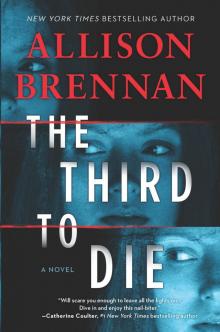 The Third to Die
The Third to Die Nothing to Hide
Nothing to Hide No Way Out
No Way Out Cold as Ice
Cold as Ice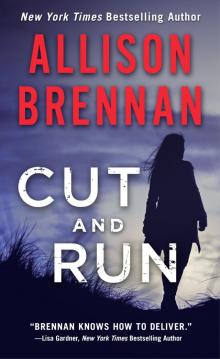 Cut and Run
Cut and Run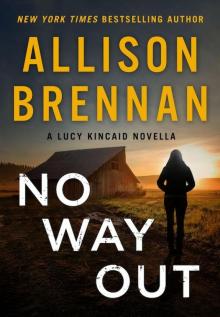 No Way Out (Lucy Kincaid Novels)
No Way Out (Lucy Kincaid Novels) Storm Warning
Storm Warning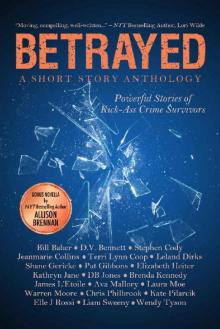 Betrayed: Powerful Stories of Kick-Ass Crime Survivors
Betrayed: Powerful Stories of Kick-Ass Crime Survivors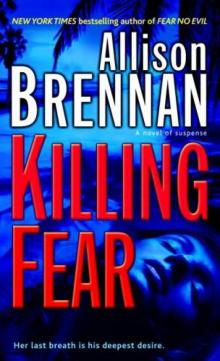 Killing Fear pb-1
Killing Fear pb-1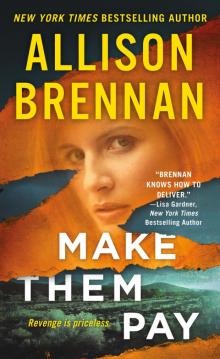 Make Them Pay
Make Them Pay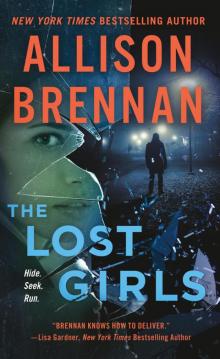 The Lost Girls
The Lost Girls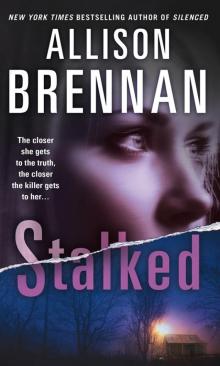 Stalked
Stalked Killing Justice
Killing Justice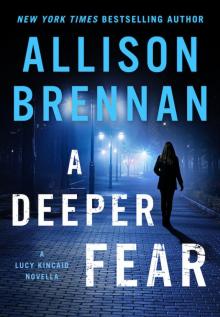 A Deeper Fear
A Deeper Fear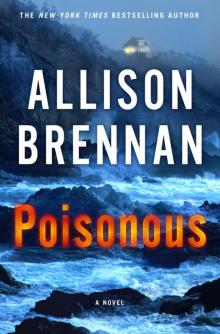 Poisonous
Poisonous Fear No Evil
Fear No Evil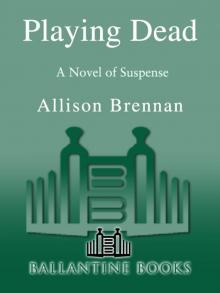 Playing Dead
Playing Dead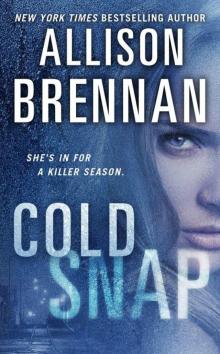 Cold Snap
Cold Snap Vacation Interrupted
Vacation Interrupted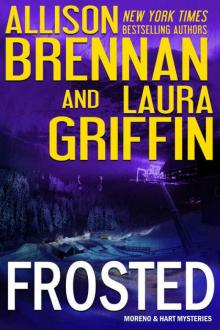 Frosted (Moreno & Hart Mysteries)
Frosted (Moreno & Hart Mysteries)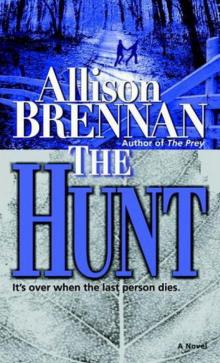 2 - The Hunt
2 - The Hunt Stolen
Stolen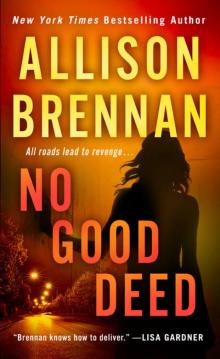 No Good Deed
No Good Deed Cutting Edge
Cutting Edge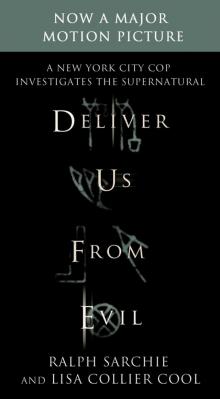 Deliver Us from Evil
Deliver Us from Evil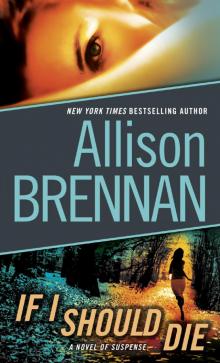 If I Should Die
If I Should Die Speak No Evil
Speak No Evil Silenced lk-4
Silenced lk-4 Original Sin sds-1
Original Sin sds-1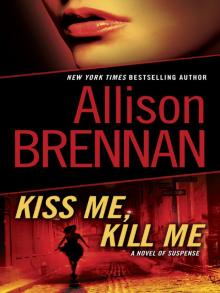 Kiss Me, Kill Me lk-2
Kiss Me, Kill Me lk-2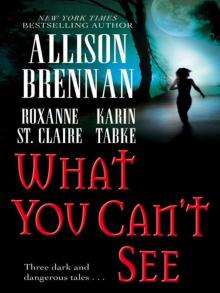 What You Can’t See
What You Can’t See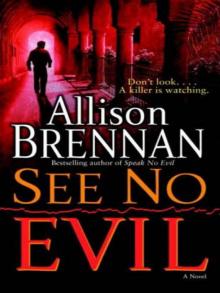 See No Evil
See No Evil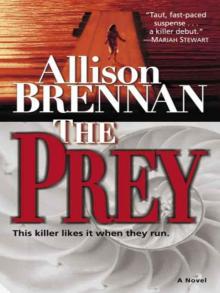 The Prey
The Prey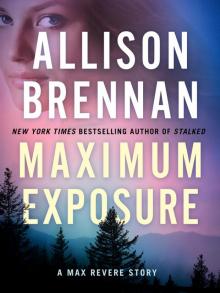 Maximum Exposure
Maximum Exposure Fatal Secrets f-2
Fatal Secrets f-2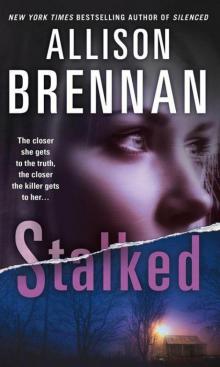 Stalked lk-5
Stalked lk-5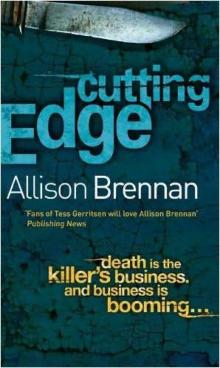 Cutting Edge f-3
Cutting Edge f-3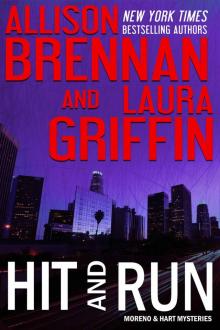 Hit and Run (Moreno & Hart Mysteries)
Hit and Run (Moreno & Hart Mysteries)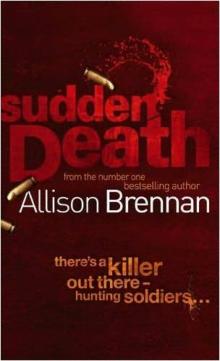 Sudden Death f-1
Sudden Death f-1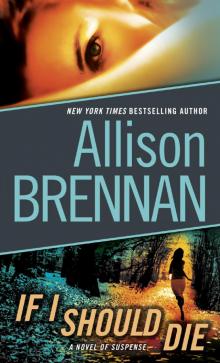 If I Should Die lk-3
If I Should Die lk-3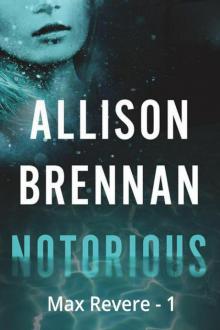 Notorious
Notorious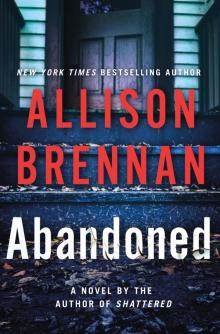 Abandoned
Abandoned Fatal Secrets
Fatal Secrets The Hunt
The Hunt Carnal Sin sds-2
Carnal Sin sds-2 Love Is Murder
Love Is Murder Lost and Found
Lost and Found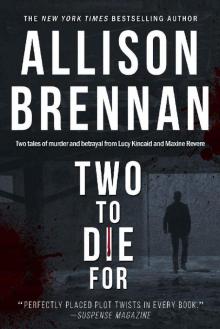 TWO TO DIE FOR
TWO TO DIE FOR Breaking Point
Breaking Point Best Laid Plans
Best Laid Plans Carnal Sin
Carnal Sin Silenced
Silenced Dead Heat
Dead Heat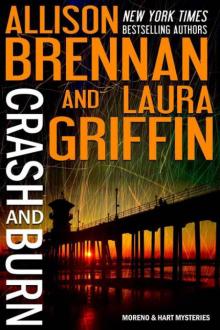 Crash and Burn
Crash and Burn Sudden Death
Sudden Death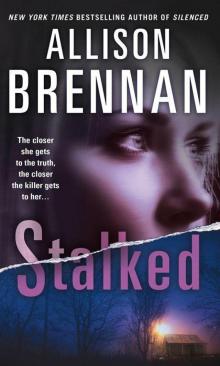 Lucy - 05 - Stalked
Lucy - 05 - Stalked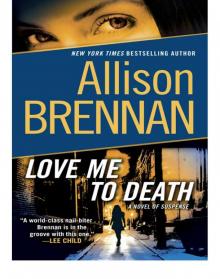 Mortal Sin
Mortal Sin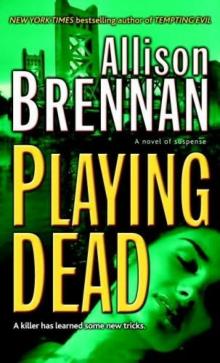 Playing Dead pb-3
Playing Dead pb-3 Kiss Me, Kill Me
Kiss Me, Kill Me Original Sin: The Seven Deadly Sins
Original Sin: The Seven Deadly Sins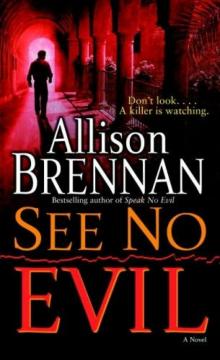 See No Evil e-2
See No Evil e-2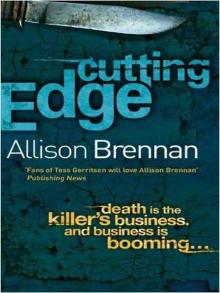 Cutting Edge: A Novel of Suspense
Cutting Edge: A Novel of Suspense Original Sin
Original Sin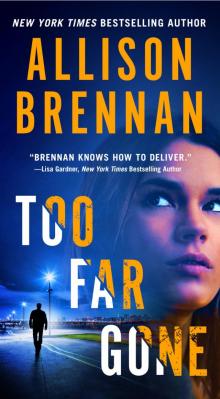 Too Far Gone
Too Far Gone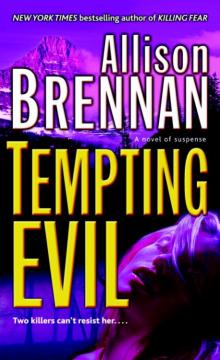 Tempting Evil
Tempting Evil Shattered
Shattered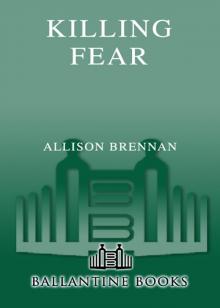 Killing Fear
Killing Fear Murder in the River City
Murder in the River City Love Is Murder (lucy kincaid)
Love Is Murder (lucy kincaid)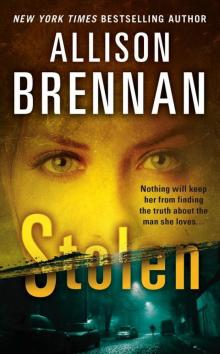 Stolen (Lucy Kincaid Novels)
Stolen (Lucy Kincaid Novels)